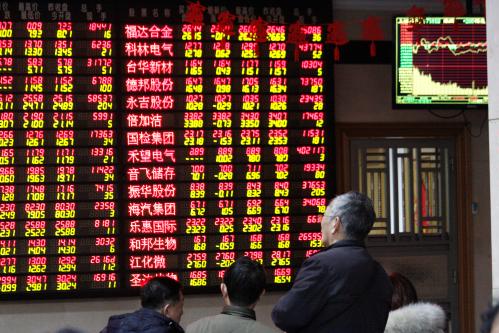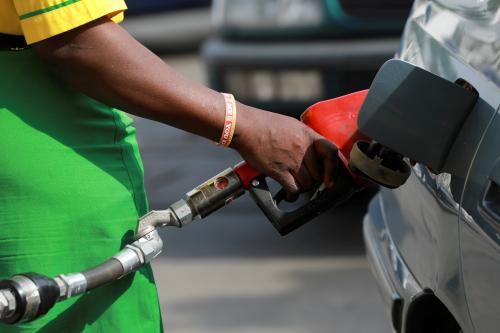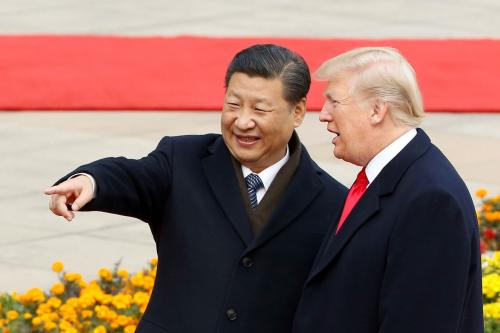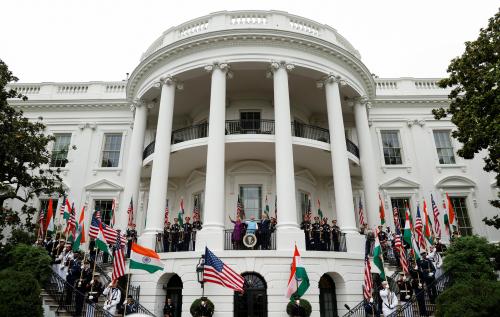The global COVID-19 pandemic and ensuing sharp decline in oil demand, coupled with an ongoing price war between Saudi Arabia and Russia, have brought oil prices to the brink. This month, those prices fell to an 18-year-low, and world leaders have been meeting in emergency sessions to try to navigate the crisis.
On April 10, experts from the Brookings Foreign Policy program joined an on-the-record call with reporters to discuss these developments and other impacts of COVID-19 on key oil producers and the geopolitical landscape.
 Samantha Gross (@samanthaenergy), Fellow in the Energy Security and Climate Initiative: “[On April 9] the OPEC+ group, OPEC plus Russia and a few other producers, had an emergency meeting to think about what to do in response to just plummeting oil demand. We all know that at the beginning of last month, they couldn’t come to an agreement to cut production more or even to continue their previous production cuts, and Saudis in response basically started a price war and decided that they would pump up their own production in retaliation. That was an absolutely ludicrous move in an oil market that has lost as much as 20 million barrels per day, maybe more, off of a 100-million-barrel-per-day market so something needed to give…the producers for the most part agreed to an output cut of about 10 million barrels per day.”
Samantha Gross (@samanthaenergy), Fellow in the Energy Security and Climate Initiative: “[On April 9] the OPEC+ group, OPEC plus Russia and a few other producers, had an emergency meeting to think about what to do in response to just plummeting oil demand. We all know that at the beginning of last month, they couldn’t come to an agreement to cut production more or even to continue their previous production cuts, and Saudis in response basically started a price war and decided that they would pump up their own production in retaliation. That was an absolutely ludicrous move in an oil market that has lost as much as 20 million barrels per day, maybe more, off of a 100-million-barrel-per-day market so something needed to give…the producers for the most part agreed to an output cut of about 10 million barrels per day.”
“I think the thing that we have to remember is the ultimate blame for this is the virus. We have never seen demand destruction like this, 20 to 25% of the market going away almost in the blink of an eye.”
 Bruce Riedel, Senior Fellow in the Center for Middle East Policy: “Saudi decision making on oil in the last month has been described by our ambassador in Riyadh John Abizaid as impulsive and reckless. I think he has it right on the mark. The crown prince Mohammad bin Salman has been the leading driver of the Saudi decision to ramp up oil. He overruled the advice of his half brother Abdelaziz bin Salman, the first royal ever to become minister of energy, who said that this wouldn’t work and who has been borne out. The increase in Saudi production of course hurt the American fracking industry very badly and continues to do so. This has produced a very significant backlash in American politics, particularly among Republicans, who up until this moment had generally been willing to stand by the Saudis over things like the [Jamal] Khashoggi affair and Yemen war. On this one, they have broken very strongly with the Saudis.”
Bruce Riedel, Senior Fellow in the Center for Middle East Policy: “Saudi decision making on oil in the last month has been described by our ambassador in Riyadh John Abizaid as impulsive and reckless. I think he has it right on the mark. The crown prince Mohammad bin Salman has been the leading driver of the Saudi decision to ramp up oil. He overruled the advice of his half brother Abdelaziz bin Salman, the first royal ever to become minister of energy, who said that this wouldn’t work and who has been borne out. The increase in Saudi production of course hurt the American fracking industry very badly and continues to do so. This has produced a very significant backlash in American politics, particularly among Republicans, who up until this moment had generally been willing to stand by the Saudis over things like the [Jamal] Khashoggi affair and Yemen war. On this one, they have broken very strongly with the Saudis.”
 Angela Stent (@AngelaStent), Nonresident Senior Fellow in the Center on the United States and Europe: “If we go back just a mere month ago, we have to remind ourselves that although Russia had the OPEC+ agreement with the Saudis since 2016, Igor Sechin, the CEO of Rosneft and arguably the second most powerful man in Russia, had never liked it. He didn’t like the idea that Rosneft had to limit its production and he said famously: ‘If you give up market share, you never get it back.’ When the Russians and Saudis were speaking a month ago, the Russians wanted to have the existing agreement with the Saudis last until June. The Saudis of course said no. At that point, the Russian budget was based on $42-a-barrel oil whereas the Saudis, as Bruce has just said, needed $85 oil in order to balance their budget. Therefore, they obviously had different views on this, economic views…Why [have] the Russians now come round and have agreed to cut their production? First of all, it turned out that even though the Russians were producing more oil, they didn’t have enough storage for that oil…Then of course the other reason is the pandemic. It’s COVID-19. The Russian economy is in a free fall.”
Angela Stent (@AngelaStent), Nonresident Senior Fellow in the Center on the United States and Europe: “If we go back just a mere month ago, we have to remind ourselves that although Russia had the OPEC+ agreement with the Saudis since 2016, Igor Sechin, the CEO of Rosneft and arguably the second most powerful man in Russia, had never liked it. He didn’t like the idea that Rosneft had to limit its production and he said famously: ‘If you give up market share, you never get it back.’ When the Russians and Saudis were speaking a month ago, the Russians wanted to have the existing agreement with the Saudis last until June. The Saudis of course said no. At that point, the Russian budget was based on $42-a-barrel oil whereas the Saudis, as Bruce has just said, needed $85 oil in order to balance their budget. Therefore, they obviously had different views on this, economic views…Why [have] the Russians now come round and have agreed to cut their production? First of all, it turned out that even though the Russians were producing more oil, they didn’t have enough storage for that oil…Then of course the other reason is the pandemic. It’s COVID-19. The Russian economy is in a free fall.”
 Suzanne Maloney (@MaloneySuzanne), Interim Vice President and Director of Brookings Foreign Policy: “It is, I think, an unfortunate irony that the United States hasn’t been able to really assert a significant leadership role in this body in order to address the broader economic crisis that has been exacerbated by the oil price war between the Saudis and the Russians. The irony comes from the fact, of course, that President Trump really came into office determined to double down on the United States’ relationship with both the Saudis and the Russians and ultimately those personalistic bonds haven’t been able to help him to shape better outcomes or to play any kind of significant crisis management role at a time when not only the global economy, but from the perspective of a president who sees things very much through his own personal interest, his own reelection prospects really do hang in the balance of finding a durable solution to the oil price war.”
Suzanne Maloney (@MaloneySuzanne), Interim Vice President and Director of Brookings Foreign Policy: “It is, I think, an unfortunate irony that the United States hasn’t been able to really assert a significant leadership role in this body in order to address the broader economic crisis that has been exacerbated by the oil price war between the Saudis and the Russians. The irony comes from the fact, of course, that President Trump really came into office determined to double down on the United States’ relationship with both the Saudis and the Russians and ultimately those personalistic bonds haven’t been able to help him to shape better outcomes or to play any kind of significant crisis management role at a time when not only the global economy, but from the perspective of a president who sees things very much through his own personal interest, his own reelection prospects really do hang in the balance of finding a durable solution to the oil price war.”
The Brookings Institution is committed to quality, independence, and impact.
We are supported by a diverse array of funders. In line with our values and policies, each Brookings publication represents the sole views of its author(s).










Commentary
Brookings experts comment on oil market developments and geopolitical tensions
April 13, 2020